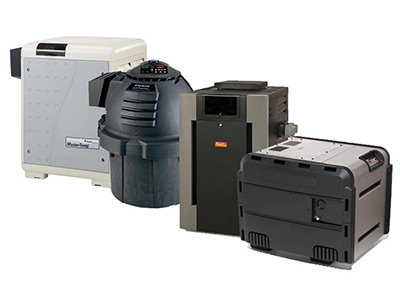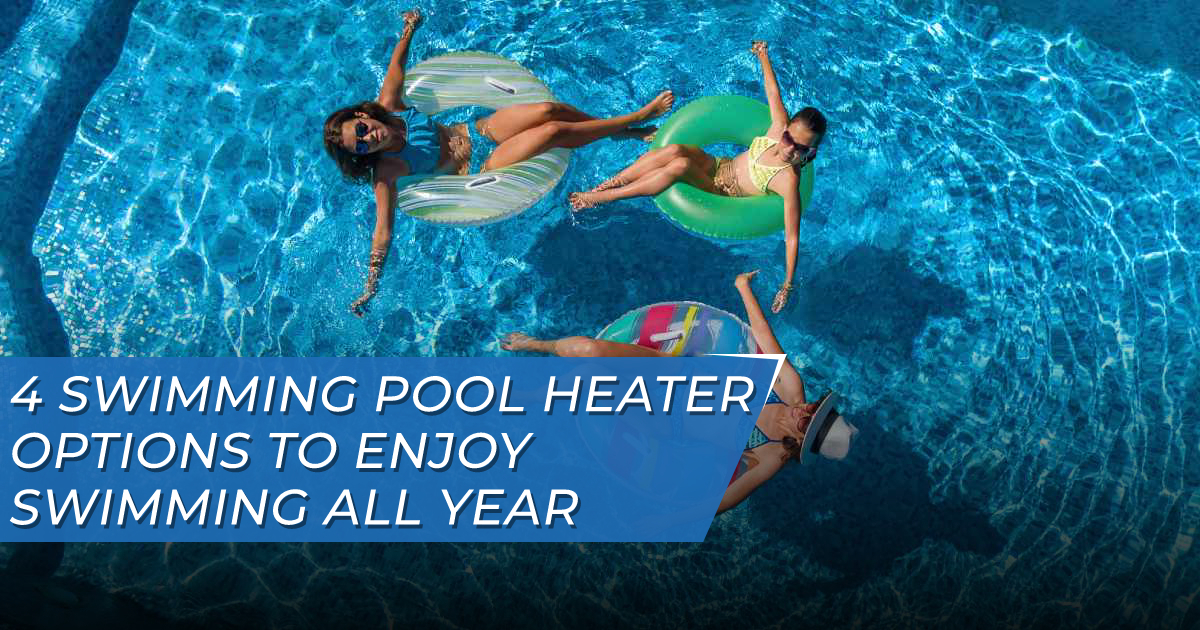4 Swimming Pool Heater Options To Enjoy Swimming All Year
Swimming pool heaters aren’t a necessity in our Florida climate, but neither are they a luxury. Many of our customers love to extend the usable time in their pools by swimming on warmer days during the winter or on cooler days during the spring or fall. Without a heater, pool water can become downright chilly and uncomfortable, even when the sun is shining and you feel hot on the pool deck.
Pool Heater Options
Whether you want to install a heater for the first time, or looking for a replacement, available pool heater options are electric, gas, propane, and solar. Here are the major considerations of each.
Electric Heat Pumps
 Don’t confuse an electric pool heater with a heat pump. A traditional electric heater warms your pool by heating the interior of a metal coil, which is then exposed to the pool water. Heat pumps, on the other hand, work by extracting heat from the air and transferring it to the pool water. Air heats the refrigerant inside the pump, which uses a compressor to heat it further. The air eventually compresses into a very hot gas, which the pump’s heat exchanger transfers to the pool water to heat it. Most heat pumps run on electricity, although some models are powered by solar.
Don’t confuse an electric pool heater with a heat pump. A traditional electric heater warms your pool by heating the interior of a metal coil, which is then exposed to the pool water. Heat pumps, on the other hand, work by extracting heat from the air and transferring it to the pool water. Air heats the refrigerant inside the pump, which uses a compressor to heat it further. The air eventually compresses into a very hot gas, which the pump’s heat exchanger transfers to the pool water to heat it. Most heat pumps run on electricity, although some models are powered by solar.
Electric heaters are the least efficient to operate because they take a long time to heat the water. Because it takes a long time to raise the temperature, a lot of electricity is used. These heaters are among the least expensive to purchase, but you’ll spend more money, in the long run, operating one.
Heat pumps use electricity more efficiently but because they draw heat from the air, they work by drawing heat from the air, they are generally inefficient when the outside temperature drops below 45 or 50 degrees Fahrenheit. Thus, we may not recommend one of these units if you want to extend your swimming season into the colder months of the year. Although heat pumps cost more to buy than gas heaters, they use much less energy and last longer.
Related Article: How To Choose the Right Electric Swimming Pool Heater
Related Article: Pool Heat Pumps: The Pros and Cons of This Type of Heater
Gas Heaters
Gas heats your pool, quickly. Depending on the model, many are also somewhat energy efficient and typically last about five years. They heat the water evenly, although they do consume more fuel in the winter. Just as with furnaces, the newer models that we carry are much more energy efficient than those manufactured five or 10 years ago. Look for gas heaters with at least 90 percent efficiency to realize considerable savings over an old unit. In addition, newer heaters have pilotless ignition, as opposed to older units with a pilot light that ran constantly, resulting in a waste of gas. Consider buying a Low Nox heater, which has lower emissions and is better for the environment.
Gas pool heaters come in a variety of sizes, which are measured in British Thermal Units, commonly called BTUs. Pool heaters come in sizes ranging from 100,000 BTUs to 500,000 BTUs. The larger the number the greater the unit’s capacity and the faster it will heat the water. Coil heaters and convection heaters are the two most common types for warming pool water.
Propane Heaters
Propane heaters operate on the same principle as natural gas heaters. To use a natural gas heater, you must run a line out to your pool area. However, if your area doesn’t have a natural gas supply or if you don’t want to run a line, the next option is heating your pool via propane. This involves using a portable tank, in much the same way that your portable gas grill operates. If you choose this route, you will have to actively monitor your fuel supply and refill the tank frequently. Propane is a denser fuel than natural gas, which means you can get a greater amount of energy from the same amount of BTUs. The drawback is that propane is considerably more expensive.
Solar Heaters
Solar swimming pool heaters are much easier to install than those for your home. These heaters work by collecting water from your pool and diverting it to a group of solar collectors where it is warmed and then pumped back into the pool. Solar types come in 3 types: unglazed collectors, glazed collectors, and polypropylene (PP) veined mats. Unglazed collectors have heavy-duty rubber or plastic panels with an ultraviolet light inhibitor. The second type uses copper tubing on an aluminum plate and a tempered glass cover.
Note that you will require a considerable area in your yard to accommodate the solar panels if you opt for a solar heater. Additionally, if you change to a solar heater from another type, your pool will also require a new pump due to the larger pumping requirement due to the diversion of water into the solar collectors.
We carry a large supply of swimming pool heater products to fit your needs. Browse through our website to compare units and prices from respected brands such as Pentair, Hayward, Rheem, Thermeau, and Raypak.
Pool Heater Options: Choosing the Right One
When purchasing a new heater, decide what characteristics are important to you when weighing pool heater options. Do you want one that will heat the pool quickly, or is energy efficient or price more important? What about the effect of the heater on the environment? These variables will help us point you toward certain types of heaters and will better allow us to serve you.
Another important consideration is sizing. Just as sizing is important when choosing a heating or air conditioning system for your home, so it is when selecting a pool heater. One that is too large will use an excessive amount of energy while operating, while one that is too small will run more frequently and decrease the life of the unit. Our certified pool technicians will size your pool and recommend the right size unit.
Proper pool heater installation is also paramount. Don’t risk doing the job yourself. Heaters must be installed properly because if they are not, the warranty could be voided. Let us help you find a reliable installation contractor who can do the job.
Whatever your pool needs are, don’t hesitate to contact us at GPS Pools for all of your needs involving pool maintenance, product selection, installation, renovation, and much more. Call one of our locations in New Tampa, Lutz, and Land O’ Lakes for more information and to schedule an appointment.

